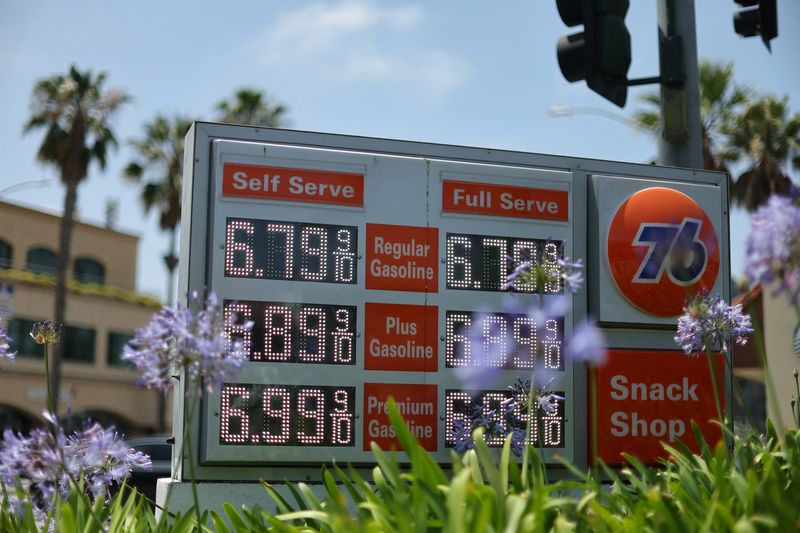By Trevor Hunnicutt and Jarrett Renshaw
WASHINGTON (Reuters) -U.S. President Joe Biden, under pressure over sky-high gasoline prices, on Wednesday demanded oil refining companies explain why they are not putting more fuel on the market as they reap windfall profits.
Biden wrote to executives from Marathon Petroleum Corp (NYSE:MPC), Valero Energy Corp (NYSE:VLO) and Exxon Mobil Corp (NYSE:XOM), and complained they had cut back on oil refining to pad profits, according to a copy of the letter https://docsend.com/view/qpg3e8a2s3fbxi3a seen by Reuters.
The letter was also sent to Phillips 66 (NYSE:PSX), Chevron Corp (NYSE:CVX), BP (NYSE:BP) and Shell (LON:RDSa), a White House official, who declined to be identified, told Reuters.
"At a time of war, refinery profit margins well above normal being passed directly onto American families are not acceptable," Biden wrote, adding the lack of refining was driving up gas prices faster than oil prices.
Biden said the industry's lack of action is blunting the administration's attempts to offset the impact of oil-rich Russia's invasion of Ukraine, such as releases from the U.S. oil reserves and adding more ethanol to gasoline.
Energy companies are enjoying bumper profits since the invasion, which added to a supply squeeze driving crude prices above $100 a barrel. Fuel demand has remained robust despite record-high gasoline prices.
White House spokesperson Karine Jean-Pierre said refiners have a "patriotic duty" to increase supplies and cut consumer costs.
"We are calling on them to do the right thing, to be patriots here," she told reporters.
U.S. refining capacity peaked in April 2020 at just under 19 million barrels per day (bpd), when prices tanked during the pandemic and refiners shut several unprofitable facilities. As of March, refining capacity was 17.9 million bpd, but there have been other closures announced since then.
U.S. refiners are running at near-peak levels to process fuel - currently at 94% of capacity. They say there is little they can do to quickly satisfy Biden's demands.
"Our refineries are running full out," Bruce Niemeyer, corporate vice president of strategy and sustainability at Chevron, said on the sidelines of a Reuters energy transition conference on Tuesday, before the letter was made public.
Shell is "producing at capacity" and looking at options to increase oil and gasoline production, a spokesperson said.
Exxon, the focus of the president's ire against oil companies last week, has invested to expand its refining capacity by 250,000 bpd, the equivalent of a medium-sized refinery, said spokesman Todd Spitler.
Spitler said the administration in the short term could lift the Jones Act provisions that force domestic shippers to use U.S. flagged vessels that employ union labor, or waive fuel regulations.
The U.S. government has waived summertime bans on the use of cheaper, smog causing fuel components in emergency cases. The administration recently used emergency powers to lift the ban on gasoline with higher blends of ethanol.
Phillips 66, Valero and Marathon Petroleum said they would work with the administration. Chevron and BP did not immediately comment.
HIGH INFLATION
Biden has escalated his rhetoric against oil companies as pump prices have raced to record highs above $5 per gallon.
Privately, White House officials have been asking refiners about idled plants and spare capacity and whether there are other ways to increase gasoline supply, according to two sources familiar with the discussions.
Rising gas prices have helped drive unexpectedly persistent consumer price inflation and voter anger before Nov. 8 midterm elections where Biden's Democratic Party is defending its control of Congress.
Biden has attributed rising oil prices primarily to U.S.-led sanctions that took Russian energy supplies off the global market.
He has also blamed major oil companies riding rising energy prices to record earnings, and giving profits to investors rather than spending on new drilling and refining capacity.
"Exxon made more money than God this year," Biden said last week, after the major's first quarter profit doubled from the previous year to $5.48 billion.
Exxon's Spitler said the top U.S. producer has invested more than $50 billion over the past five years that resulted in a nearly 50% increase in U.S. oil output.

U.S. Energy Secretary Jennifer Granholm plans to host an emergency meeting on how refiners can respond to higher prices, Biden said, asking oil companies to provide "concrete ideas" to increase oil refining and explain why they may have cut such capacity in the last two years.
Granholm has requested a meeting with refinery executives no later than June 21, two sources familiar with the request said.